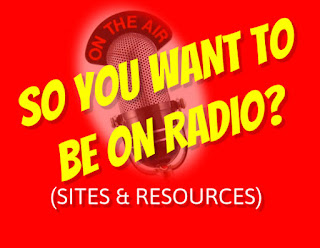RADIO BASICS: HOW TO SPEAK PROPERLY ON RADIO
Tweet
SOURCE: Ehow.com
Hi Guys, if you're interested in being a quality Radio Presenter, these tips should be quite useful!
Cheers!
You have an announcing job in radio. But it's not as simple as it seems. Follow these steps to stay on top of your game.
• Step 1 Be sure that you are speaking proper English in a clear voice. Do not use slang and do not distort your voice, except maybe for comical effect. If you have a regional accent, lose it. Be certain of word pronunciations. Be careful to avoid ending words short (an example of this would be saying "nothin'" instead of "nothing").
• Step 2 Take stock of what you are required to say. This should include your station's identifier, usually a set of call letters. This is a no brainer. It will also include, at varying times, promotional or public service announcements and the weather forecast.
• Step 3 Know what you are going to say before you speak on the air. Essentially, this information is in your head, though you can jot down notes. If you open the microphone without an idea of what you'll say, your voice will trail off and you will end up saying, "Um" and "Uh" between words.
• Step 4 Sound friendly, but real. Let the audience feel that you are smiling as you speak, unless you are transmitting serious information. In both cases, sound authoritative. Listeners expect and assume the announcer knows what they are talking about to be factual and correct.
• Step 5 Don't repeat yourself, especially in the same break. If you stated something once, with a clear, authoritative voice, the message is received. The exception is the station identifier, which commonly opens and closes your break and sometimes appears in additional announcements.
Tips & Warnings
• Tape yourself on the air. This is commonly known as an "air check." Take note of what's wrong with your performance. Ask others, both professional and personal, to give their opinion.
• With an air check, take notice of any words or terms you may be leaning on, or using, too much. Note how you frame statements. If you're doing it the same, word-for-word, every time, write down some variations to use in the future.
• Avoid interjecting a personal opinion of a negative nature. You threaten to turn off a major portion of your audience, who will turn off the radio or switch to another station.
Hi Guys, if you're interested in being a quality Radio Presenter, these tips should be quite useful!
Cheers!
You have an announcing job in radio. But it's not as simple as it seems. Follow these steps to stay on top of your game.
• Step 1 Be sure that you are speaking proper English in a clear voice. Do not use slang and do not distort your voice, except maybe for comical effect. If you have a regional accent, lose it. Be certain of word pronunciations. Be careful to avoid ending words short (an example of this would be saying "nothin'" instead of "nothing").
• Step 2 Take stock of what you are required to say. This should include your station's identifier, usually a set of call letters. This is a no brainer. It will also include, at varying times, promotional or public service announcements and the weather forecast.
• Step 3 Know what you are going to say before you speak on the air. Essentially, this information is in your head, though you can jot down notes. If you open the microphone without an idea of what you'll say, your voice will trail off and you will end up saying, "Um" and "Uh" between words.
• Step 4 Sound friendly, but real. Let the audience feel that you are smiling as you speak, unless you are transmitting serious information. In both cases, sound authoritative. Listeners expect and assume the announcer knows what they are talking about to be factual and correct.
• Step 5 Don't repeat yourself, especially in the same break. If you stated something once, with a clear, authoritative voice, the message is received. The exception is the station identifier, which commonly opens and closes your break and sometimes appears in additional announcements.
Tips & Warnings
• Tape yourself on the air. This is commonly known as an "air check." Take note of what's wrong with your performance. Ask others, both professional and personal, to give their opinion.
• With an air check, take notice of any words or terms you may be leaning on, or using, too much. Note how you frame statements. If you're doing it the same, word-for-word, every time, write down some variations to use in the future.
• Avoid interjecting a personal opinion of a negative nature. You threaten to turn off a major portion of your audience, who will turn off the radio or switch to another station.





Comments
Post a Comment